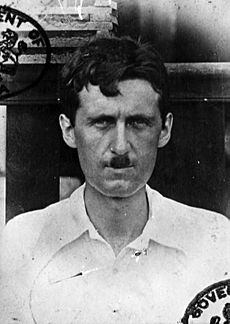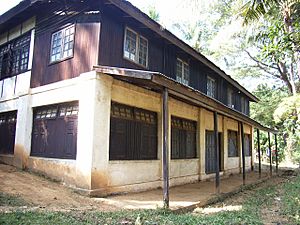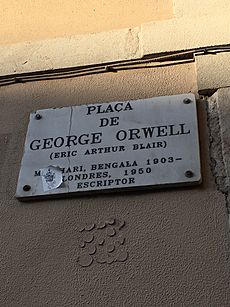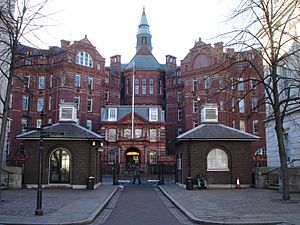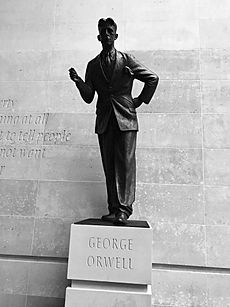George Orwell facts for kids
Quick facts for kids
George Orwell
|
|
|---|---|
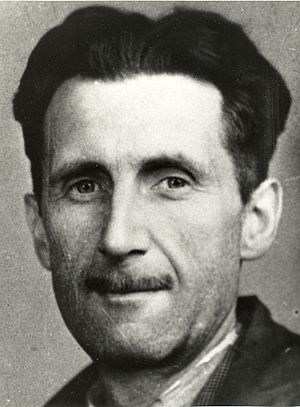
Press card portrait, 1943
|
|
| Born |
Eric Arthur Blair
25 June 1903 Motihari, Bengal, British India
|
| Died | 21 January 1950 (aged 46) London, England
|
| Resting place | All Saints' Church, Sutton Courtenay, Oxfordshire, England |
| Education | Eton College |
| Occupation |
|
| Political party | Independent Labour (from 1938) |
| Spouse(s) |
|
| Children | Richard Blair |
| Writing career | |
| Pen name | George Orwell |
| Language | English |
| Genre |
|
| Subjects |
|
| Years active | 1928–1950 |
| Notable works |
|
| Signature | |
 |
|
Eric Arthur Blair (25 June 1903 – 21 January 1950), better known by his pen name George Orwell, was an English novelist, essayist, journalist, and critic.
Born in India, Blair was raised and educated in England from when he was one year old. After school he became an Imperial policeman in Burma, before returning to Suffolk, England, where he began his writing career as George Orwell—a name inspired by a favourite location, the River Orwell. He lived from occasional pieces of journalism, and also worked as a teacher or bookseller whilst living in London. From the late 1920s to the early 1930s, his success as a writer grew and his first books were published. He was wounded fighting in the Spanish Civil War, leading to his first period of ill health on return to England. During the Second World War he worked as a journalist and, between 1941 and 1943, for the BBC. The 1945 publication of Animal Farm led to fame during his lifetime. During the final years of his life he worked on Nineteen Eighty-Four, and moved between Jura in Scotland and London. It was published in June 1949, less than a year before his death.
Orwell's work remains influential in popular culture. Many of Orwell's neologism such as "Big Brother", "Thought Police", "Newspeak", "thoughtcrime" became part of the English language. In 2008, The Times ranked George Orwell second among "The 50 greatest British writers since 1945".
Contents
Early life and education
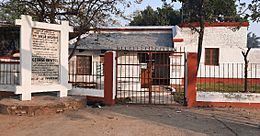
Born on 25 June 1903 in India, Blair was raised and educated in England from when he was one year old. Orwell's father, Richard Walmesley Blair, worked in the Indian Civil Service. His mother, Ida Mabel Blair, grew up in Burma. Eric had two sisters: Marjorie, five years older; and Avril, five years younger.
Eric was brought up in the company of his mother and sisters and, apart from a brief visit in mid-1907, he did not see his father until 1912. Aged five, Eric was sent as a day-boy to a convent school in Henley-on-Thames, which Marjorie also attended. It was a Roman Catholic convent run by French Ursuline nuns. His mother wanted him to have a public school education, but his family could not afford the fees. Through the social connections of Ida Blair's brother Charles Limouzin, Blair gained a scholarship to St Cyprian's School, Eastbourne, East Sussex. Arriving in September 1911, he boarded at the school for the next five years, returning home only for school holidays. Although he knew nothing of the reduced fees, he "soon recognised that he was from a poorer home". Blair hated the school and many years later wrote an essay "Such, Such Were the Joys", published posthumously, based on his time there.
While at St Cyprian's, Blair wrote two poems that were published in the Henley and South Oxfordshire Standard. He came second to Connolly in the Harrow History Prize, had his work praised by the school's external examiner, and earned scholarships to Wellington and Eton. But inclusion on the Eton scholarship roll did not guarantee a place, and none was immediately available for Blair. In May 1917 a place became available as a King's Scholar at Eton. At this time the family lived at Mall Chambers, Notting Hill Gate. Blair remained at Eton until December 1921, when he left midway between his 18th and 19th birthdays.
Blair's academic performance reports suggest that he neglected his studies, but during his time at Eton he worked with Roger Mynors to produce a college magazine, The Election Times, joined in the production of other publications and participated in the Eton Wall Game. His parents could not afford to send him to a university without another scholarship, and they concluded from his poor results that he would not be able to win one. Runciman noted that he had a romantic idea about the East, and the family decided that Blair should join the Imperial Police, the precursor of the Indian Police Service. For this he had to pass an entrance examination. In December 1921 he left Eton and travelled to join his retired father, mother, and younger sister Avril, who that month had moved to 40 Stradbroke Road, Southwold, Suffolk, the first of their four homes in the town. Blair was enrolled at a crammer there called Craighurst, and brushed up on his Classics, English, and History. He passed the entrance exam, coming seventh out of the 26 candidates who exceeded the pass mark.
Policing in Burma
Blair's maternal grandmother lived at Moulmein, so he chose a posting in Burma, then still a province of British India. In October 1922 he sailed on board SS Herefordshire via the Suez Canal and Ceylon to join the Indian Imperial Police in Burma. He was appointed an Assistant District Superintendent (on probation) on 29 November 1922, with effect from 27 November and at the pay of Rs. 525 per month.
In Burma, Blair acquired a reputation as an outsider. He spent much of his time alone, reading or pursuing non-pukka activities, such as attending the churches of the Karen ethnic group. A colleague, Roger Beadon, recalled (in a 1969 recording for the BBC) that Blair was fast to learn the language and that before he left Burma, "was able to speak fluently with Burmese priests in 'very high-flown Burmese'." Blair made changes to his appearance in Burma that remained for the rest of his life, including adopting a pencil moustache. Emma Larkin writes in the introduction to Burmese Days, "While in Burma, he acquired a moustache similar to those worn by officers of the British regiments stationed there."
At the end of 1926, he was assigned to Katha in Upper Burma, where he contracted dengue fever in 1927. Entitled to a leave in England that year, he was allowed to return in July due to his illness. While on leave in England and on holiday with his family in Cornwall in September 1927, he reappraised his life. Deciding against returning to Burma, he resigned from the Indian Imperial Police to become a writer, with effect from 12 March 1928 after five-and-a-half years of service. He drew on his experiences in the Burma police for the novel Burmese Days (1934) and the essays "A Hanging" (1931) and "Shooting an Elephant" (1936).
Teaching career
In April 1932 Blair became a teacher at The Hawthorns High School, a school for boys, in Hayes, West London. This was a small school offering private schooling for children of local tradesmen and shopkeepers, and had only 14 or 16 boys aged between ten and sixteen, and one other master.
In mid-1933 Blair left Hawthorns to become a teacher at Frays College, in Uxbridge, west London. This was a much larger establishment with 200 pupils and a full complement of staff. He acquired a motorcycle and took trips through the surrounding countryside. On one of these expeditions he became soaked and caught a chill that developed into pneumonia. He was taken to a cottage hospital in Uxbridge, where for a time his life was believed to be in danger. When he was discharged in January 1934, he returned to Southwold to convalesce and, supported by his parents, never returned to teaching.
Spanish Civil War
Orwell set out for Spain on 23 December 1936 to fight in the Spanish Civil War with the antifascist troops. He was sent to the relatively quiet Aragon Front under Georges Kopp. By January 1937 he was at Alcubierre 1,500 feet (460 m) above sea level, in the depth of winter. There was very little military action and Orwell was shocked by the lack of munitions, food and firewood as well as other extreme deprivations. With his Cadet Corps and police training, Orwell was quickly made a corporal.
In 1937, he was wounded in the throat by a sniper's bullet. The bullet had missed his main artery by the barest margin and his voice was barely audible. It had been such a clean shot that the wound immediately went through the process of cauterisation. He received electrotherapy treatment and was declared medically unfit for service.
In the first week of July 1937 Orwell arrived back at Wallington. Orwell's experiences in the Spanish Civil War gave rise to Homage to Catalonia (1938).
Literary career and legacy
During most of his career, Orwell was best known for his journalism, in essays, reviews, columns in newspapers and magazines and in his books of reportage: Down and Out in Paris and London (describing a period of poverty in these cities), The Road to Wigan Pier (describing the living conditions of the poor in northern England, and class division generally) and Homage to Catalonia. According to Irving Howe, Orwell was "the best English essayist since Hazlitt, perhaps since Dr Johnson".
Modern readers are more often introduced to Orwell as a novelist, particularly through his enormously successful titles Animal Farm and Nineteen Eighty-Four. The former is often thought to reflect degeneration in the Soviet Union after the Russian Revolution and the rise of Stalinism; the latter, life under totalitarian rule. Nineteen Eighty-Four is often compared to Brave New World by Aldous Huxley; both are powerful dystopian novels warning of a future world where the state machine exerts complete control over social life. In 1984, Nineteen Eighty-Four and Ray Bradbury's Fahrenheit 451 were honoured with the Prometheus Award for their contributions to dystopian literature. In 2011 he received it again for Animal Farm. In 2003, Nineteen Eighty-Four was listed at number 8 and Animal Farm at number 46 on the BBC's The Big Read poll. In 2021, readers of the New York Times Book Review rated Nineteen Eighty-Four third in a list of "The best books of the past 125 years."
Coming Up for Air, his last novel before World War II, is the most "English" of his novels; alarms of war mingle with images of idyllic Thames-side Edwardian childhood of protagonist George Bowling. The novel is pessimistic; industrialism and capitalism have killed the best of Old England, and there were great, new external threats.
Orwell as literary critic
Throughout his life Orwell continually supported himself as a book reviewer. His reviews are well known and have had an influence on literary criticism.
Food writing
In 1946, the British Council commissioned Orwell to write an essay on British food as part of a drive to promote British relations abroad. In the essay titled British Cookery, Orwell described the British diet as "a simple, rather heavy, perhaps slightly barbarous diet" and where "hot drinks are acceptable at most hours of the day". He discusses the ritual of breakfast in the UK, "this is not a snack but a serious meal. The hour at which people have their breakfast is of course governed by the time at which they go to work." He wrote that high tea in the United Kingdom consisted of a variety of savoury and sweet dishes, but "no tea would be considered a good one if it did not include at least one kind of cake", before adding "as well as cakes, biscuits are much eaten at tea-time". Orwell included a recipe for marmalade, a popular British spread on bread. However, the British Council declined to publish the essay on the grounds that it was too problematic to write about food at the time of strict rationing in the UK. In 2019, the essay was discovered in the British Council's archives along with the rejection letter. The British Council issued an official apology to Orwell over the rejection of the commissioned essay.
Final months and death
Orwell's health continued to decline after the diagnosis of tuberculosis in December 1947. He died early on the morning of 21 January, at age 46.
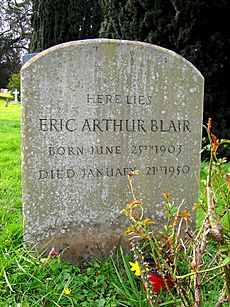
Orwell had requested to be buried in accordance with the Anglican rite in the graveyard of the closest church to wherever he happened to die. The graveyards in central London had no space, and so in an effort to ensure his last wishes could be fulfilled, his widow appealed to his friends to see whether any of them knew of a church with space in its graveyard. David Astor lived in Sutton Courtenay, Berkshire (present-day Oxfordshire), and arranged for Orwell to be interred in the churchyard of All Saints' there. Orwell's gravestone bears the epitaph: "Here lies Eric Arthur Blair, born June 25th 1903, died January 21st 1950"; no mention is made on the gravestone of his more famous pen name.
Personal life
Orwell married Eileen O'Shaughnessy on 9 June 1936. There are several testaments that it was a well-matched and happy marriage.
In June 1944, Orwell and Eileen adopted a three-week-old boy they named Richard Horatio. According to Richard, Orwell was a wonderful father who gave him devoted, if rather rugged, attention and a great degree of freedom. After Orwell's death Richard went to live with Orwell's sister and her husband.
Blair was very lonely after Eileen's death in 1945, and desperate for a wife, both as companion for himself and as mother for Richard. He proposed marriage to four women, including Celia Kirwan, and eventually Sonia Brownell accepted. Orwell had met her when she was assistant to Cyril Connolly, at Horizon literary magazine. They were married on 13 October 1949, only three months before Orwell's death. Some maintain that Sonia was the model for Julia in Nineteen Eighty-Four.
Influence on language and writing
In his essay "Politics and the English Language" (1946), Orwell wrote about the importance of precise and clear language, arguing that vague writing can be used as a powerful tool of political manipulation because it shapes the way we think. In that essay, Orwell provides six rules for writers:
- Never use a metaphor, simile or other figure of speech which you are used to seeing in print.
- Never use a long word where a short one will do.
- If it is possible to cut a word out, always cut it out.
- Never use the passive where you can use the active.
- Never use a foreign phrase, a scientific word or a jargon word if you can think of an everyday English equivalent.
- Break any of these rules sooner than say anything outright barbarous.
Orwell worked as a journalist at The Observer for seven years, and its editor David Astor gave a copy of this celebrated essay to every new recruit.
In Nineteen Eighty-Four, Orwell described a totalitarian government that controlled thought by controlling language, making certain ideas literally unthinkable. Several words and phrases from Nineteen Eighty-Four have entered popular language.
- "Newspeak" is a simplified and obfuscatory language designed to make independent thought impossible.
- "Doublethink" means holding two contradictory beliefs simultaneously.
- The "Thought Police" are those who suppress all dissenting opinion.
- "Prolefeed" is homogenised, manufactured superficial literature, film and music used to control and indoctrinate the populace through docility.
- "Big Brother" is a supreme dictator who watches everyone.
The adjective "Orwellian" connotes an attitude and a policy of control by propaganda, surveillance, misinformation, denial of truth and manipulation of the past.
Orwell may have been the first to use the term "cold war" to refer to the state of tension between powers in the Western Bloc and the Eastern Bloc that followed World War II in his essay, "You and the Atom Bomb", published in Tribune on 19 October 1945.
Statue
A statue of George Orwell, sculpted by the British sculptor Martin Jennings, was unveiled on 7 November 2017 outside Broadcasting House, the headquarters of the BBC. The wall behind the statue is inscribed with the following phrase: "If liberty means anything at all, it means the right to tell people what they do not want to hear". These are words from his proposed preface to Animal Farm and a rallying cry for the idea of free speech in an open society.
Novels
- Burmese Days (1934)
- A Clergyman's Daughter (1935)
- Keep the Aspidistra Flying (1936)
- Coming Up for Air (1939)
- Animal Farm (1945)
- Nineteen Eighty-Four (8 June 1949;)
Books based on his life
- Down and Out in Paris and London (1933)
- The Road to Wigan Pier (1937)
- Homage to Catalonia (1938)
Poems
- "Romance"
- "A Little Poem"
- "Awake! Young Men of England"
- "Kitchener"
- "Our Minds are Married, But we are Too Young"
- "The Pagan"
- "The Lesser Evil"
- "Poem From Burma"
Images for kids
-
The blue house on the right was Blair's 1927 lodgings in Portobello Road, London
-
Southwold Pier in Southwold. Orwell wrote A Clergyman's Daughter (1935) in the town, basing the fictional town of Knype Hill partly on Southwold.
-
The pen name George Orwell was inspired by the River Orwell in the English county of Suffolk.
-
English Heritage blue plaque in Kentish Town, London where Orwell lived from August 1935 until January 1936.
-
A former warehouse at Wigan Pier is named after Orwell.
-
Laurence O'Shaughnessy's former home, the large house on the corner, 24 Crooms Hill, Greenwich, London
-
Orwell spoke on many BBC and other broadcasts, but no recordings are known to survive.
-
Barnhill on the Isle of Jura, Scotland. Orwell completed Nineteen Eighty-Four while living in the farmhouse.
-
One of the Animal Farm cartoon strips produced for the Cold War anti-communist department of the British Foreign Office, the IRD
See also
 In Spanish: George Orwell para niños
In Spanish: George Orwell para niños


